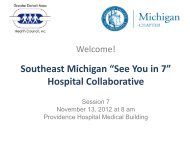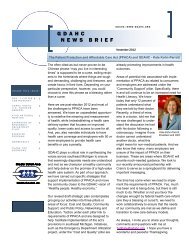GDAHC 2012 Report to the Community - Greater Detroit Area Health ...
GDAHC 2012 Report to the Community - Greater Detroit Area Health ...
GDAHC 2012 Report to the Community - Greater Detroit Area Health ...
You also want an ePaper? Increase the reach of your titles
YUMPU automatically turns print PDFs into web optimized ePapers that Google loves.
Continued from Page 1<br />
STRATEGIES:<br />
COST AND QUALITY—<strong>to</strong> create and nurture multi-stakeholder partnerships; and <strong>to</strong> engage and lead multi-stakeholder<br />
initiatives <strong>to</strong> improve <strong>the</strong> quality of health care in sou<strong>the</strong>ast Michigan while managing <strong>the</strong> overall cost of care. (The<br />
focus of this work will be on cardiac-related conditions, including a corollary reduction in disparate care, through at<br />
least 2015.)<br />
COMMUNITY SUPPORT—support projects (lead as appropriate) <strong>to</strong> improve health literacy, eliminate disparities, and<br />
increase access <strong>to</strong> appropriate care; and collaborate with o<strong>the</strong>r organizations focused on creating a healthier<br />
community.<br />
PUBLIC POLICY, NETWORKING AND EDUCATION—bring <strong>to</strong>ge<strong>the</strong>r disparate voices and facilitate robust community dialogue<br />
on <strong>to</strong>ugh, controversial health care <strong>to</strong>pics; create networking opportunities across <strong>the</strong> health care sec<strong>to</strong>r; and offer<br />
education opportunities.<br />
To those of you who were looking for a bold statement that we have completely transformed <strong>GDAHC</strong>, I hope you are not<br />
disappointed. We are still a work in progress and have taken tremendous strides in moving <strong>GDAHC</strong> <strong>to</strong> a better place—a place<br />
where we deliver results and create a positive Return on Investment for our members and our community.<br />
<strong>2012</strong> was a year of discovery and deliberation.<br />
2013 will be <strong>the</strong> year for transformation. Multi-stakeholder support and commitment have been <strong>the</strong> hallmarks of <strong>GDAHC</strong>’s his<strong>to</strong>ry;<br />
and we need that now more than ever. Sou<strong>the</strong>ast Michigan awaits <strong>the</strong> changes in health and health care that we will bring forth<br />
<strong>to</strong>ge<strong>the</strong>r. We are counting on you <strong>to</strong> be part of this exciting chapter in <strong>GDAHC</strong>’s evolution.<br />
All <strong>the</strong> best and thanks for your support,<br />
Kate<br />
Improving Cardiac Care and Reducing <strong>the</strong> Risks of Heart Disease<br />
The <strong>Greater</strong> <strong>Detroit</strong> <strong>Area</strong> <strong>Health</strong> Council continues <strong>to</strong> work <strong>to</strong>wards reducing heart failure readmissions and reducing <strong>the</strong> risks associated<br />
with heart disease. These goals were set by <strong>GDAHC</strong>’s multi-stakeholder Aligning Forces for Quality (AF4Q) Planning Team in<br />
<strong>the</strong> summer of 2010 as <strong>the</strong>y planned for <strong>the</strong> third round of AF4Q projects. AF4Q is <strong>the</strong> Robert Wood Johnson Foundation’s signature<br />
effort <strong>to</strong> lift <strong>the</strong> overall quality of health care in targeted communities, reduce racial and ethnic disparities and provide models<br />
for national reform. <strong>GDAHC</strong> is proud <strong>to</strong> be one of 16 AF4Q communities across <strong>the</strong> country.<br />
Sou<strong>the</strong>ast Michigan “See You in 7” Hospital<br />
Collaborative<br />
In order <strong>to</strong> achieve <strong>GDAHC</strong>’s goal of reducing heart failure<br />
readmissions, <strong>GDAHC</strong> has launched <strong>the</strong> Sou<strong>the</strong>ast Michigan<br />
“See You in 7” Hospital Collaborative in partnership<br />
with <strong>the</strong> American College of Cardiology and MPRO, Michigan’s<br />
Quality Improvement Organization. The Collaborative<br />
focuses on process measures from <strong>the</strong> ACC’s “See You in 7”<br />
<strong>to</strong>olkit <strong>to</strong> increase and improve follow-up appointments<br />
within 7 days of discharge. Twelve sou<strong>the</strong>ast Michigan hospitals<br />
are participating in <strong>the</strong> Collaborative.<br />
Four “See You in 7” Sessions have been held, including two<br />
in-person sessions and two webinars. Sessions have focused<br />
on hospital/outpatient provider collaboration <strong>to</strong><br />
achieve and improve <strong>the</strong> follow-up appointment, heart<br />
failure clinics, and <strong>the</strong> importance of administrative buy-in.<br />
Based on <strong>the</strong> evaluations, <strong>the</strong> sessions have been valuable<br />
for participants, and <strong>the</strong> most useful portion of <strong>the</strong> sessions<br />
has been <strong>the</strong> roundtable discussions on achieving <strong>the</strong> selected<br />
process measures. Monthly sessions will continue <strong>to</strong><br />
be held until <strong>the</strong> Collaborative ends in April 2013.<br />
MPRO will supply <strong>GDAHC</strong>, <strong>the</strong> ACC and Collaborative<br />
participant hospitals with readmissions and outpatient follow<br />
-up data <strong>to</strong> show any progress made during <strong>the</strong> course of <strong>the</strong><br />
Collaborative.<br />
Cardiac Disease Prevention Exercise Pilot<br />
In order <strong>to</strong> achieve <strong>GDAHC</strong>’s goal of reducing <strong>the</strong> risks<br />
associated with heart disease, <strong>GDAHC</strong> is launching a Cardiac<br />
Disease Prevention Exercise Pilot, which will kick-off in<br />
Oc<strong>to</strong>ber, when sessions begin. Over thirty patients have<br />
signed on <strong>to</strong> participate in <strong>the</strong> initiative, which will replicate a<br />
successful exercise program aimed at preventing heart<br />
disease. Implemented in a community setting, <strong>the</strong> Program<br />
will recruit a diverse group of adults without known heart<br />
disease but who have risk fac<strong>to</strong>rs <strong>to</strong> commit <strong>to</strong> participate in<br />
a structured exercise program. Goals of <strong>the</strong> program include<br />
demonstrating reduction of risk fac<strong>to</strong>rs in participants and<br />
creation of a template program that can be widely<br />
implemented throughout <strong>the</strong> community.<br />
2




